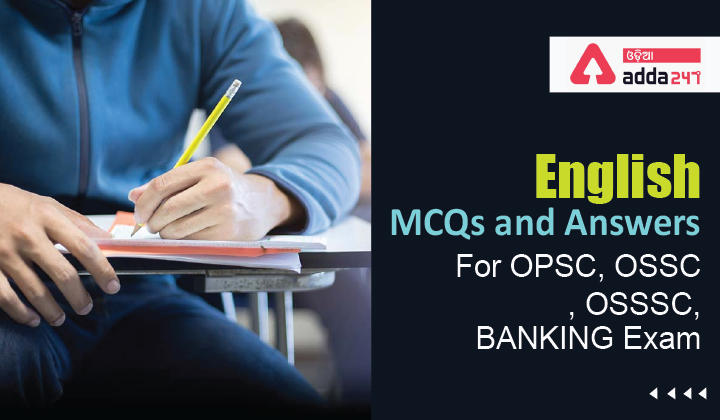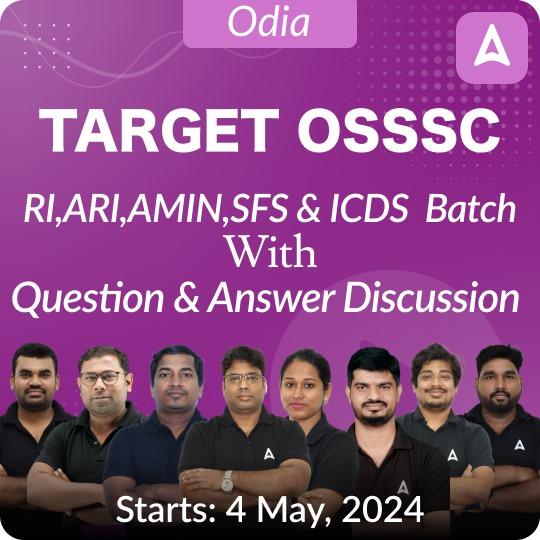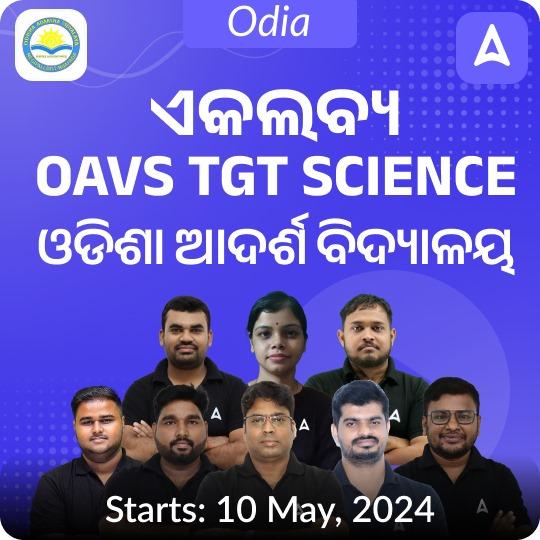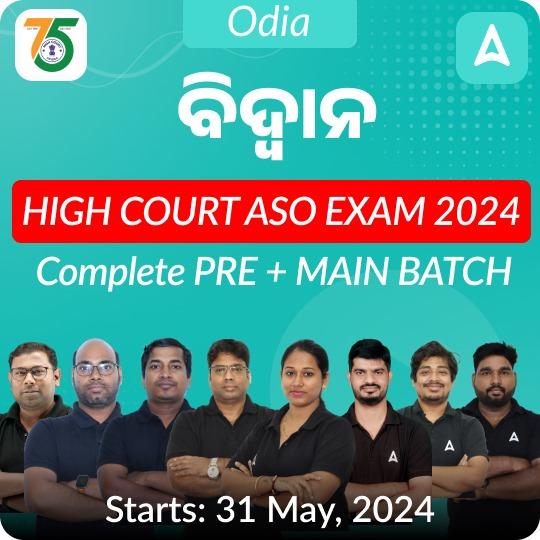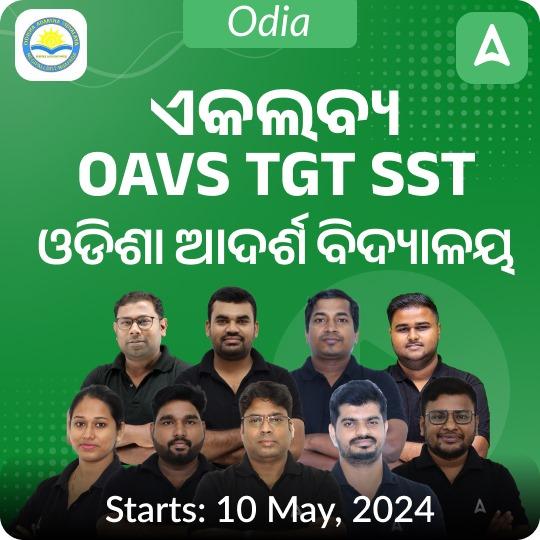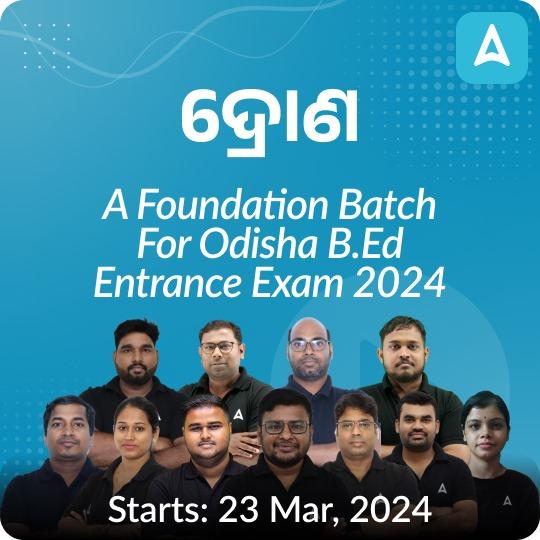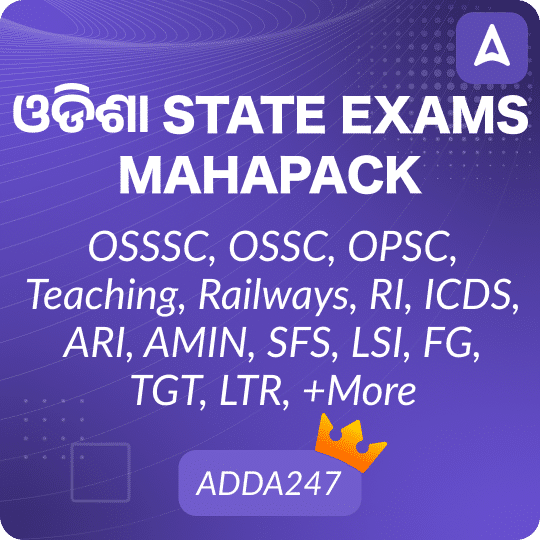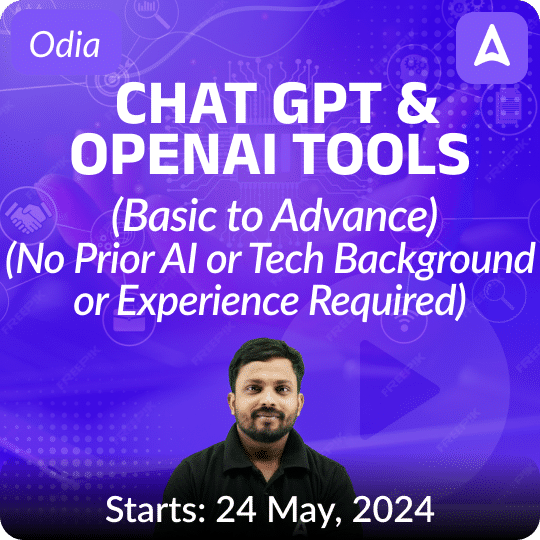English MCQs and Answers: English MCQs are essential for OPSC, OSSC, OSSSC & Other State Exams. Aspirants willing to apply for the various Government exams in 2022 must go through the topics of general English for competitive exams, as the English language is a key part of the syllabus.
Download ADDA247 Odia APP – Appear Latest Exam Test Series & Live Classes
Directions (1-10): Select the most appropriate option to fill in the blank in the given sentence.
Q1. After succeeding, we should not go _______________ celebrating our success.
(a) Overboard
(b) Dispassionate
(c) Unnoticed
(d) Overconfident
S1. Ans. (a)
Sol. The correct answer is option a.
The word that can be in the blank is, ‘Overboard’.
As per the context of the passage the word `Overboard’ fits in properly & hence it is
the correct choice.
Q2. From childhood, Malappuram’s Jamsheer, a 25-year-old BTech Graduate, had a special ___________ in his heart for agriculture.
(a) Room
(b) Interest
(c) Catch
(d) Place
S2. Ans. (d)
Sol. The correct answer is option d.
The word that can be in the blank is, ‘Place’.
As per the context of the passage the word `Place’ fits in properly & hence it is
the correct choice.
Q3. University Grants Commission (UGC), is _______________ _ merit-based scholarships to undergraduate and postgraduate students.
(a) Developing
(b) Offering
(c) Passing
(d) Reporting
S3. Ans. (b)
Sol. The correct answer is option b.
The word that can be in the blank is, ‘Offering’.
As per the context of the passage the word `Offering’ fits in properly & hence it is
the correct choice.
Q4. A real farmer is someone who would __________ a significant part of his income from agriculture.
(a) Donate
(b) Drive
(c) Earned
(d) Derive
S4. Ans. (d)
Sol. The correct answer is option d.
The word that can be in the blank is, ‘Derive’.
As per the context of the passage the word `Derive’ fits in properly & hence it is
the correct choice.
Q5. Our struggles in life ___________ our strengths.
(a) Follow
(b) Develop
(c) Convey
(d) Meet
S5. Ans. (b)
Sol. The correct answer is option b.
The word that can be in the blank is, ‘Develop’.
As per the context of the passage the word `Develop’ fits in properly & hence it is
the correct choice.
Q6. A higher salary does not necessarily _________ to financial independence.
(a) Led
(b) Leads
(c) Lead
(d) Leading
S6. Ans. (c)
Sol. The correct answer is option c.
The word that can be in the blank is, ‘Lead’.
As per the context of the passage the word `Lead’ fits in properly & hence it is
the correct choice.
Q7. Water plays a ___________ role in regulating the body temperature and carrying nutrients throughout your body.
(a) Complimentary
(b) Trivial
(c) Outstanding
(d) Critical
S7. Ans. (d)
Sol. The correct answer is option d.
The word that can be in the blank is, ‘Critical’.
As per the context of the passage the word `Critical’ fits in properly & hence it is
the correct choice.
Q8. Rajasthan is considered to be a paradise for food lovers, and its cuisine offers a ______________ of nutrient-rich dishes.
(a) Sample
(b) Plethora
(c) Many
(d) Distinct
S8. Ans. (b)
Sol. The correct answer is option b.
The word that can be in the blank is, ‘Plethora’.
As per the context of the passage the word `Plethora’ fits in properly & hence it is
the correct choice.
Q9. Multiple studies, both in India and abroad, have reaffirmed the __________ that higher education leads to better financial outcomes.
(a) Hope
(b) Feeling
(c) Interest
(d) Belief
S9. Ans. (d)
Sol. The correct answer is option d.
The word that can be in the blank is, ‘Belief’.
As per the context of the passage the word `Belief’ fits in properly & hence it is
the correct choice.
Q10. A balanced diet ___________ foods from all the major food groups in the right proportions to provide the body with ideal nutrition.
(a) Reserves
(b) Maintained
(c) Preserves
(d) Comprises
S10. Ans. (d)
Sol. The correct answer is option d.
The word that can be in the blank is, ‘Comprises’.
As per the context of the passage the word `Comprises’ fits in properly & hence it is
the correct choice.

Directions (11 -15): Read the following passage and answer the questions that follow.
Malaria is a life-threatening disease caused by parasites that are transmitted to people through the bites of infected female Anopheles mosquitoes. It is preventable and curable. In 2019, there were an estimated 229 million cases of malaria worldwide. The estimated number of malaria deaths stood at 409 000 in 2019. Children aged under 5 years are the most vulnerable group affected by malaria; in 2019, they accounted for 67% (274 000) of all malaria deaths worldwide.
The WHO African Region carries a disproportionately high share of the global malaria burden. In 2019, the region was home to 94% of malaria cases and deaths.
Total funding for malaria control and elimination reached an estimated US$ 3 billion in 2019. Contributions from governments of endemic countries amounted to US$ 900 million, representing 31% of total funding.
Malaria is caused by Plasmodium parasites. The parasites are spread to people through the bites of infected female Anopheles mosquitoes, called “malaria vectors.” There are 5 parasite species that cause malaria in humans, and 2 of these species – P. falciparum and P. vivax – pose the greatest threat.
Malaria is an acute febrile illness. In a non-immune individual, symptoms usually appear 10–15 days after the infective mosquito bite. The first symptoms – fever, headache, and chills – may be mild and difficult to recognize as malaria. If not treated within 24 hours, P. falciparum malaria can progress to severe illness, often leading to death.
Children with severe malaria frequently develop one or more of the following symptoms: severe anaemia, respiratory distress in relation to metabolic acidosis, or cerebral malaria. In adults, multi-organ failure is also frequent. In malaria endemic areas, people may develop partial immunity, allowing asymptomatic infections to occur.
In 2019, nearly half of the world’s population was at risk of malaria. Most malaria cases and deaths occur in sub-Saharan Africa. However, the WHO regions of South-East Asia, Eastern Mediterranean, Western Pacific, and the Americas are also at risk.
Some population groups are at considerably higher risk of contracting malaria, and developing severe disease, than others. These include infants, children under 5 years of age, pregnant women and patients with HIV/AIDS, as well as non-immune migrants, mobile populations and travellers. National malaria control programmes need to take special measures to protect these population groups from malaria infection, taking into consideration their specific circumstances.
In most cases, malaria is transmitted through the bites of female Anopheles mosquitoes. There are more than 400 different species of Anopheles mosquito; around 30 are malaria vectors of major importance. All of the important vector species bite between dusk and dawn. The intensity of transmission depends on factors related to the parasite, the vector, the human host, and the environment.
Anopheles mosquitoes lay their eggs in water, which hatch into larvae, eventually emerging as adult mosquitoes. The female mosquitoes seek a blood meal to nurture their eggs. Each species of Anopheles mosquito has its own preferred aquatic habitat; for example, some prefer small, shallow collections of fresh water, such as puddles and hoof prints, which are abundant during the rainy season in tropical countries.
Transmission is more intense in places where the mosquito lifespan is longer (so that the parasite has time to complete its development inside the mosquito) and where it prefers to bite humans rather than other animals. The long lifespan and strong human-biting habit of the African vector species is the main reason why approximately 90% of the world’s malaria cases are in Africa.
Transmission also depends on climatic conditions that may affect the number and survival of mosquitoes, such as rainfall patterns, temperature and humidity. In many places, transmission is seasonal, with the peak during and just after the rainy season. Malaria epidemics can occur when climate and other conditions suddenly favour transmission in areas where people have little or no immunity to malaria. They can also occur when people with low immunity move into areas with intense malaria transmission, for instance to find work, or as refugees.
Q11. As per the passage, which region of the WHO carries a disproportionately high share of the global malaria burden?
(a) South-East Asia
(b) Western Pacific
(c) African Region
(d) The America
S11. Ans (c)
Sol. The correct answer is option c.
Refer to, ‘The WHO African Region carries a disproportionately high share of the global malaria burden. In 2019, the region was home to 94% of malaria cases and deaths.’
Q12. As per the passage, the intensity of transmission depends on which factors?
(a) The vector
(b) The human host
(c) The environment
(d) All of these
S12. Ans (d)
Sol. The correct answer is option d.
Refer to, ‘In most cases, malaria is transmitted through the bites of female Anopheles mosquitoes. ………. The intensity of transmission depends on factors related to the parasite, the vector, the human host, and the environment.’
Q13. Which of the following statement (s) is / are false as per the context of the passage?
(i) The parasites are spread to people through the bites of infected male Anopheles mosquitoes, called “malaria vectors.”
(ii) Most malaria cases and deaths occur in sub-Saharan Africa.
(iii) There are 4 parasite species that cause malaria in humans, and 2 of these species pose the greatest threat.
(a) Both (i) and (iii)
(b) Only (i)
(c) Both (i) and (ii)
(d) Only (ii)
S13. Ans (a)
Sol. The correct answer is option a.
Refer to, ‘Malaria is caused by Plasmodium parasites. The parasites are spread to people through the bites of infected female Anopheles mosquitoes, called “malaria vectors.” There are 5 parasite species that cause malaria in humans, and 2 of these species – P. falciparum and P. vivax – pose the greatest threat.
Q14. As per the passage, what percentage of the population of children are the most affected by malaria?
(a) 67%
(b) 94%
(c) 31%
(d) 90%
S14. Ans (a)
Sol. The correct answer is option a.
Refer to, ‘Malaria is a life-threatening disease caused by parasites …………Children aged under 5 years are the most vulnerable group affected by malaria; in 2019, they accounted for 67% (274 000) of all malaria deaths worldwide.
Q15. Which of the following statement (s) is / are true as per the context of the passage?
(i) In many places, transmission is seasonal, with the peak during and just after the rainy season.
(ii) Total funding for malaria control and elimination reached an estimated US$ 900 million in 2019.
(iii) If not treated within 24 hours, P. falciparum malaria can progress to severe illness, often leading to death.
(a) Both (i) and (ii)
(b) Both (i) and (iii)
(c) Only (ii)
(d) Only (i)
S15. Ans (b)
Sol. The correct answer is option b.
Refer to, ‘Total funding for malaria control and elimination reached an estimated US$ 3 billion in 2019. Contributions from governments of endemic countries amounted to US$ 900 million, representing 31% of total funding.’
Refer to, ‘Malaria is an acute febrile illness………. If not treated within 24 hours, P. falciparum malaria can progress to severe illness, often leading to death.’
Refer to, ‘Transmission also depends on climatic conditions that may affect the number and survival of mosquitoes, such as rainfall patterns, temperature and humidity. In many places, transmission is seasonal, with the peak during and just after the rainy season.’
History MCQs and Answers For Odisha Exam
Reasoning MCQs and Answers For Odisha Exam
English MCQs and Answers For Odisha Exam
General Awareness MCQs and Answers For Odisha Exam

